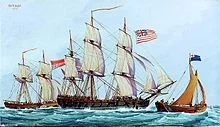Esek Hopkins - Commander of the Continental Navy
Esek Hopkins was the first Commodore of the Continental Navy.
Published 3/18/18 - Updated 10/20/21
Esek Hopkins
Esek Hopkins made his living sailing merchant ships and working as a privateer, sailing all over the world.
His most famous journey, unfortunately, was a disastrous attempt at becoming a slave trader during which most of the people carried on his ship died. This horrifying ordeal sparked many in his home of Rhode Island to begin pushing for abolition.
A decade after his return, the Revolutionary War broke out and Esek (whose brother Stephen was a former Governor and Continental Congressman) was commissioned as a Brigadier General in put in charge of Rhode Island’s soldiers.
Continental Navy
Three months later the Continental Navy was established and Esek Hopkins was chosen as Commodore of the fleet.
Commodore Hopkins lead the fledgling Navy out of Philadelphia with eight ships.
Esek was instructed to survey the British ships in the Chesapeake and, if possible, attack them. If this could not be done, he was free to do what he thought best for the Cause.
Nassau
AFter determining an attack on the British in the Chesapeake would destroy the new navy, Commodore Hopkins decided to take his little fleet and sail to the Bahamas.
They went to Nassau, then called New Providence, where they attacked one of the island’s forts. They managed to get troops on the ground and take the fort.
This was the first landing of U.S. Marines on foreign soil.
Hopkins loaded his ships with all the weapons and ammunition available and set sail for Rhode Island. They needed to get the supplies to the Continental Army.
Return Voyage
As passing Long Island the Navy had a run in with the Brits but were able to take two ships.
Unfortunately the real prize, the Glasgow, got away.
In this battle his son, John Burroughs Hopkins, was injured while captaining one of the ships.
Luckily, the encounter gave Esek more supplies to bring to George Washington.
Disgrace
After his return, Hopkins was censured by Congress for failing to attack in the Chesapeake and letting Glasgow get away.
This was mostly due to politics and infighting in Congress. Hopkins was defended by many, including John Adams, Benjamin Franklin and John Hancock.
In hindsight, Hopkins did exactly what he should have. If the Navy attacked the British in the Chesapeake, they may have been slaughtered.
The victory in Nassau brought the Continental Army much needed supplies at an early stage in the war. This is what he should be remembered for.
Sign up for our email list for a new article every day. Also, try one of these books on Hopkins and the U.S. Navy:





